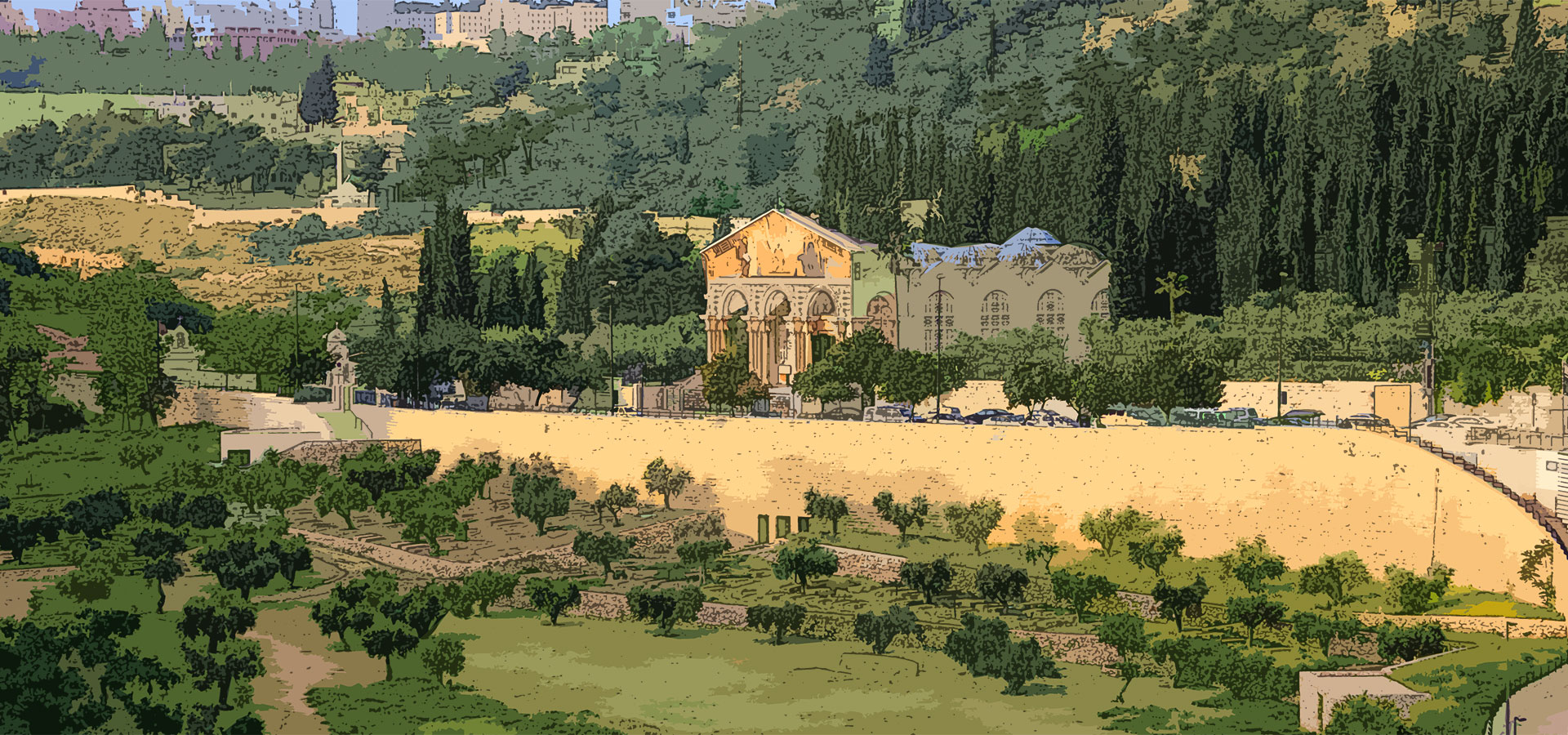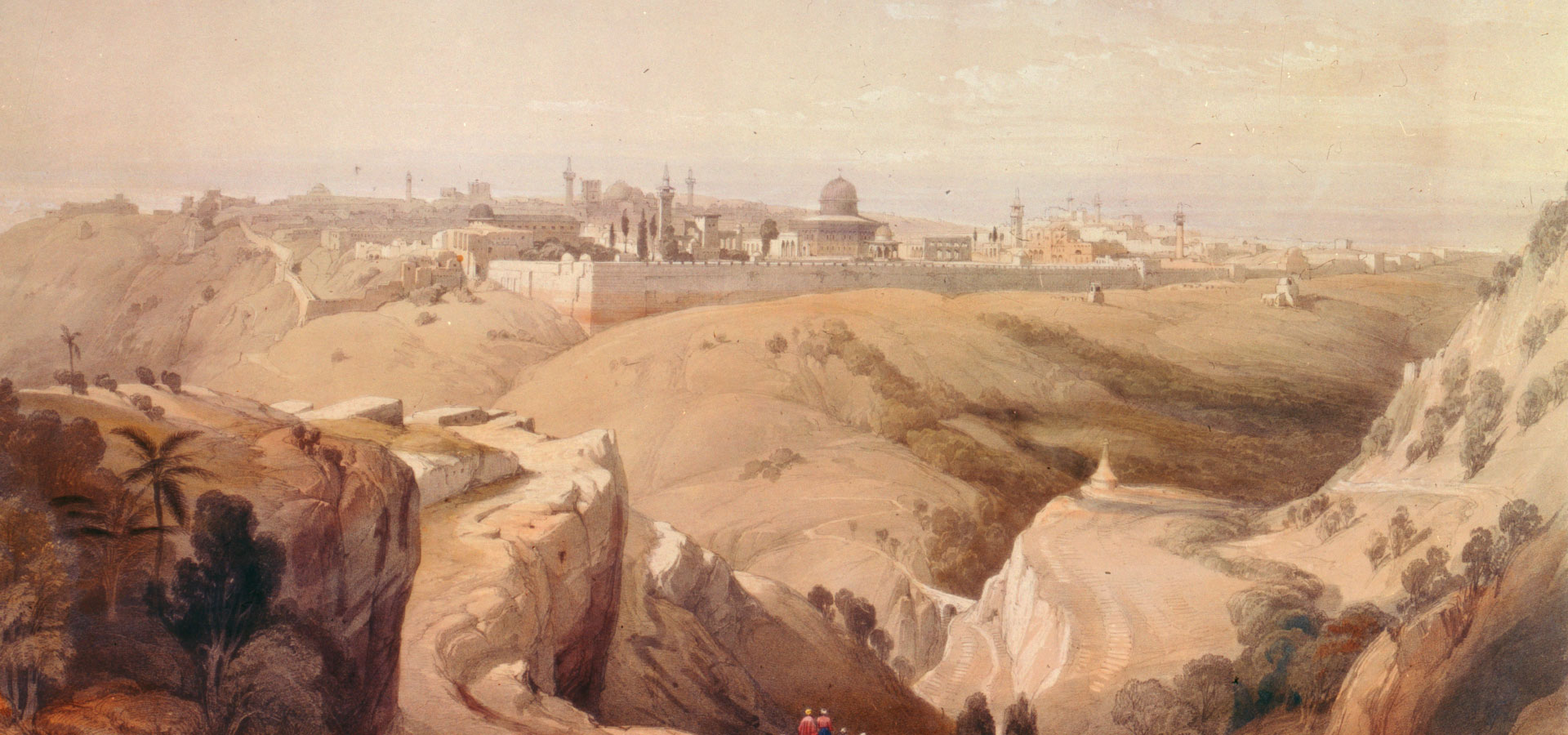The Mount of Olives is one of most important biblical sites in the Holy Land related to the live of Jesus, the Messiah and also to the King David. This mountain appear in the Hebrew and Greek Bible, OT and NT and make part of important decisions made by the most important ancient king of Israel, David and the messiah, Jesus.
Millions of people visit it place year by years to have the privileges to see the Holy City panoramic view similar to Jesus view when proclaim prophecies about the Holy City destiny.
The Mount of Olives, is a small range of four summits, the highest being 830 m, which overlooks Jerusalem and the Temple Mount from the E across the Kidron Valley and the Pool of Siloam. Thickly wooded in Jesus’ day, rich in the olives which occasioned its name, the mount was denuded of trees in the time of Titus. All the ground is holy, for Christ unquestionably walked there, though particularized sites, with their commemorative churches, may be questioned. From the traditional place of Jesus’ baptism, on Jordan’s bank, far below sea level, Olivet’s distant summit 1,200 m higher, a traditional site of the ascension, is clearly visible, for Palestine is a small land of long perspectives.
The OT references to Olivet at 2 Sa. 15:30; Ne. 8:15; Ezk. 11:23 are slight. 1 Ki. 11:7 and 2 Ki. 23:13 refer to Solomon’s idolatry, the erection of high places to Chemosh and Molech, which probably caused one summit to be dubbed the Mount of Offence. In the eschatological future the Lord will part the Mount in two as he stands on it (Zc. 14:4).
Jews resident in Jerusalem used to announce the new moon to their compatriots in Babylonia by a chain of beacons starting on Olivet, each signalling the lighting of the next. But since Samaritans lit false flares, eventually human messengers had to replace the old beacons. G. H. Dalman considers the Mishnaic claim that this beacon service stretched as far afield as Mesopotamia perfectly feasible (Sacred Sites and Ways, 1935, p. 263, n. 7). The Mount has close connections with the red heifer (*Clean and Unclean) and its ashes of purification (Nu. 19; Parah 3. 6–7, 11), as with other ceremonies of levitical Judaism.
According to one legend, the dove sent forth from the ark by Noah plucked her leaf from Olivet (Gn. 8:11; Midrash Genesis Rabba 33. 6). Some believed that the faithful Jewish dead must be resurrected in Israel, that those who died abroad would eventually be rolled back through underground cavities (Ketuboth 111a), emerging at the sundered Mount of Olives (H. Loewe and C. G. Montefiore, A Rabbinic Anthology, 1938, pp. 660ff.). When the Shekinah, or radiance of God’s presence, departed from the Temple through sin, it was said to linger for 3–1/2 years on Olivet, vainly awaiting repentance (Lamentations Rabba, Proem 25; cf. Ezk. 10:18). The name ‘Mountain of Three Lights’ comes from the glow of the flaming Temple altar reflected on the hillside by night, the first beams of sunrise gilding the summit, and the oil from the olives which fed the Temple lamps.
Near the Church of All Nations, at the base of Olivet, are some venerable olive-trees, not demonstrably 2,000 years old. This is the area of Gethsemane, and the precise spot of the Agony, though undetermined, is close by. Half-way up the hill is the Church of Dominus Flevit. But why should our Lord weep there, half-way down? HDB cogently argues that he really approached Jerusalem by Bethany, round the S shoulder of Olivet, weeping when the city suddenly burst into view. A succession of churches of the ascension have long crowned the reputed summit of our Lord’s assumption, and his supposed footprints are carefully preserved there as a tangible fulfilment of Zc. 14:4. Yet Luke’s Gospel favours the Bethany area as the real scene of the Ascension. The visitor to Palestine learns the futility of pondering insolubles.
“Olives, Mount Of,” NBD, 845-846.

Jesus on the Mount Olives
And Jesus went out, and departed from the temple: and his disciples came to him for to shew him the buildings of the temple. And Jesus said unto them, See ye not all these things? verily I say unto you, There shall not be left here one stone upon another, that shall not be thrown down.And as he sat upon the mount of Olives, the disciples came unto him privately, saying, Tell us, when shall these things be? and what shall be the sign of thy coming, and of the end of the world?
Matthew 24:1–3 KJV
And when they came nigh to Jerusalem, unto Bethphage and Bethany, at the mount of Olives, he sendeth forth two of his disciples, And saith unto them, Go your way into the village over against you: and as soon as ye be entered into it, ye shall find a colt tied, whereon never man sat; loose him, and bring him.And if any man say unto you, Why do ye this? say ye that the Lord hath need of him; and straightway he will send him hither.
Mark 11:1–3 KJV
And as he sat upon the mount of Olives over against the temple, Peter and James and John and Andrew asked him privately, Tell us, when shall these things be? and what shall be the sign when all these things shall be fulfilled?
And Jesus answering them began to say, Take heed lest any man deceive you:For many shall come in my name, saying, I am Christ; and shall deceive many.And when ye shall hear of wars and rumours of wars, be ye not troubled: for such things must needs be; but the end shall not be yet.For nation shall rise against nation, and kingdom against kingdom: and there shall be earthquakes in divers places, and there shall be famines and troubles: these are the beginnings of sorrows.But take heed to yourselves: for they shall deliver you up to councils; and in the synagogues ye shall be beaten: and ye shall be brought before rulers and kings for my sake, for a testimony against them.And the gospel must first be published among all nations.But when they shall lead you, and deliver you up, take no thought beforehand what ye shall speak, neither do ye premeditate: but whatsoever shall be given you in that hour, that speak ye: for it is not ye that speak, but the Holy Ghost.Now the brother shall betray the brother to death, and the father the son; and children shall rise up against their parents, and shall cause them to be put to death.And ye shall be hated of all men for my name’s sake: but he that shall endure unto the end, the same shall be saved.
Mark 13:3–13 KJV

David on the Mount of Olives
And David went up by the ascent of mount Olivet, and wept as he went up, and had his head covered, and he went barefoot: and all the people that was with him covered every man his head, and they went up, weeping as they went up.
And one told David, saying, Ahithophel is among the conspirators with Absalom. And David said, O LORD, I pray thee, turn the counsel of Ahithophel into foolishness. And it came to pass, that when David was come to the top of the mount, where he worshipped God, behold, Hushai the Archite came to meet him with his coat rent, and earth upon his head: Unto whom David said, If thou passest on with me, then thou shalt be a burden unto me: But if thou return to the city, and say unto Absalom, I will be thy servant, O king; as I have been thy father’s servant hitherto, so will I now also be thy servant: then mayest thou for me defeat the counsel of Ahithophel. And hast thou not there with thee Zadok and Abiathar the priests? therefore it shall be, that what thing soever thou shalt hear out of the king’s house, thou shalt tell it to Zadok and Abiathar the priests. Behold, they have there with them their two sons, Ahimaaz Zadok’s son, and Jonathan Abiathar’s son; and by them ye shall send unto me every thing that ye can hear. So Hushai David’s friend came into the city, and Absalom came into Jerusalem.
And when David was a little past the top of the hill, behold, Ziba the servant of Mephibosheth met him, with a couple of asses saddled, and upon them two hundred loaves of bread, and an hundred bunches of raisins, and an hundred of summer fruits, and a bottle of wine. And the king said unto Ziba, What meanest thou by these? And Ziba said, The asses be for the king’s household to ride on; and the bread and summer fruit for the young men to eat; and the wine, that such as be faint in the wilderness may drink.
2 Samuel 15:30–16:2 KJV



